Nicotine / THR - Statements from Organizations
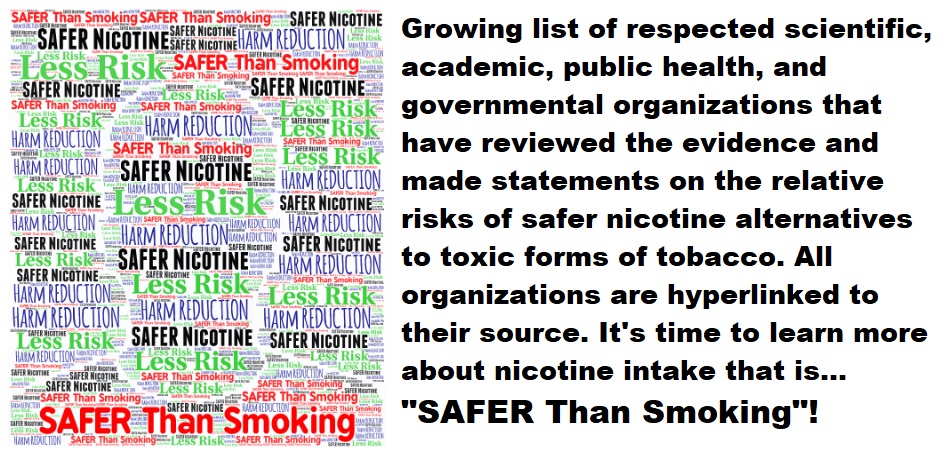
"Tobacco Harm Reduction = SAFER than smoking"
The items list below may also be found on this Google Doc
Multinational / International
World Health Organization EURO Office
International Agency for Research on Cancer
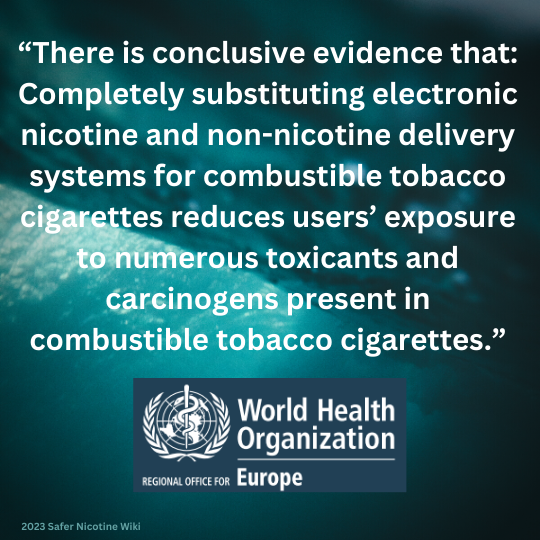
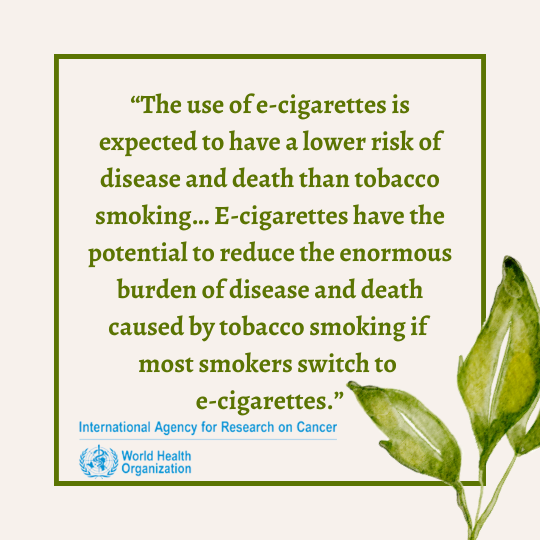
European Parliament
SCENIHR - European Commission Directorate-General, Health & Consumer Protection
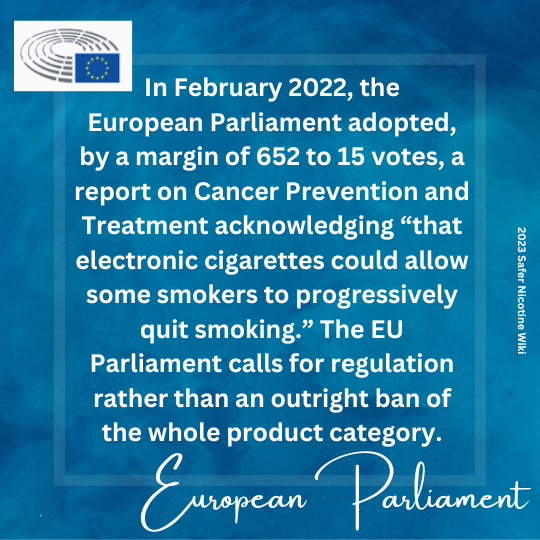
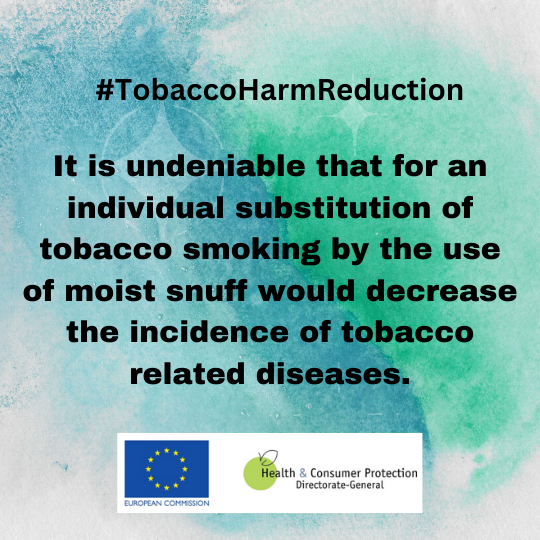
Cochrane systematic evidence review
- Source / 78 scientific studies (including >34 randomized control trials) involving 22,052 participants in a dozen countries.
15 past presidents of the Society for Research on Nicotine and Tobacco (SRNT)
- Source NOTE: This is not a statement by the SRNT.
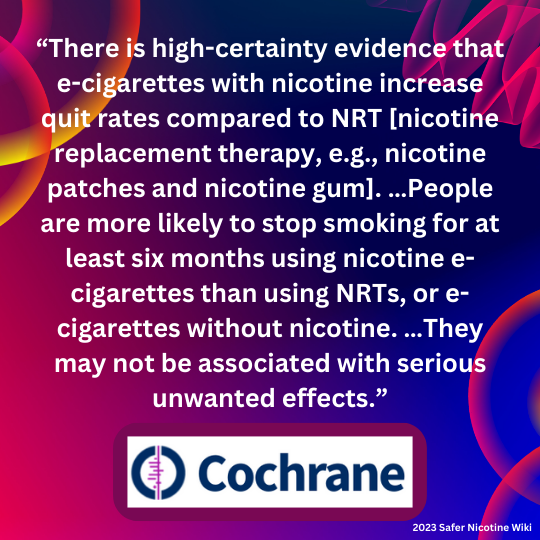
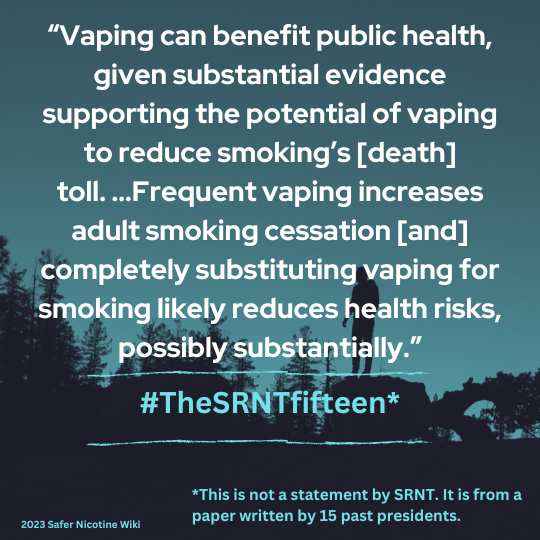
World Heart Federation
The Tobacco Atlas
- Source / Vital Strategies was formed out of a merger between World Lung Foundation and The Union.
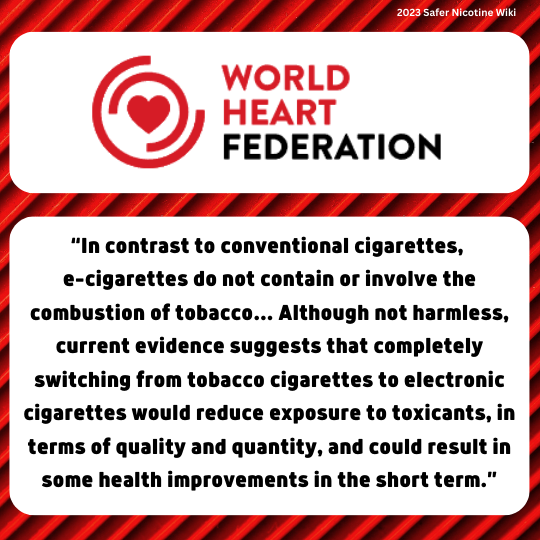
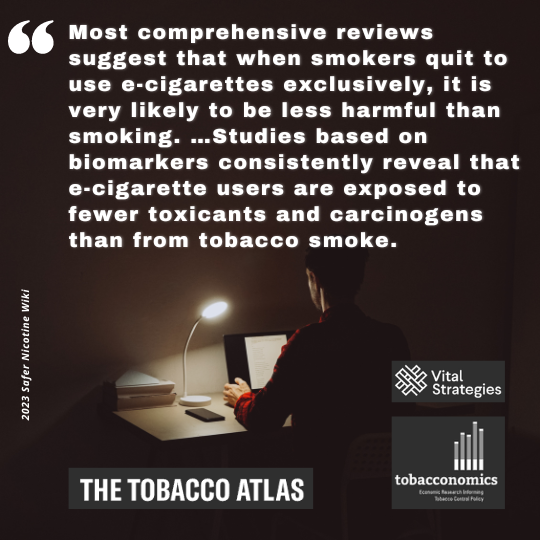
Region: England, Ireland, Scotland, and Wales
UK Department of Health, Towards a Smokefree Generation - A Tobacco Control Plan for England
Office for Health Improvement & Disparities
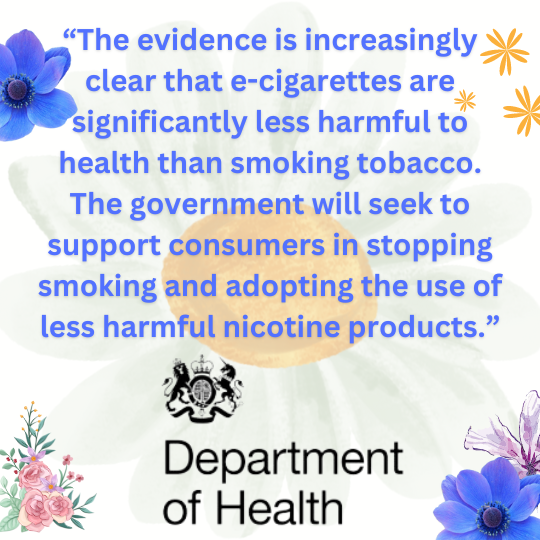
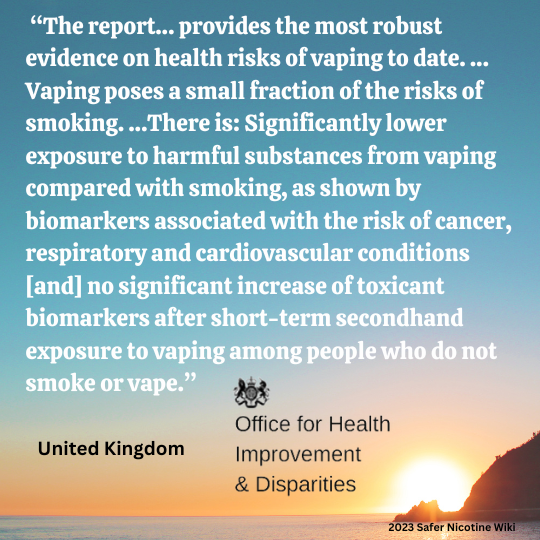
Public Health England
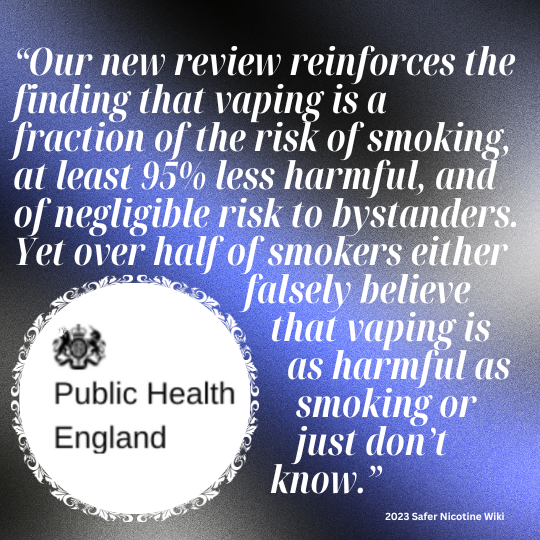
Royal College of Physicians
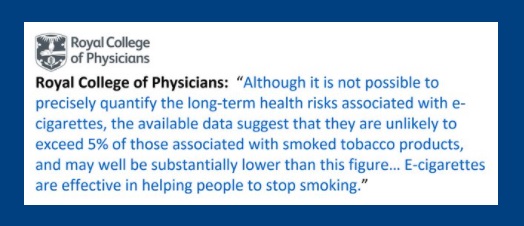
British Medical Association
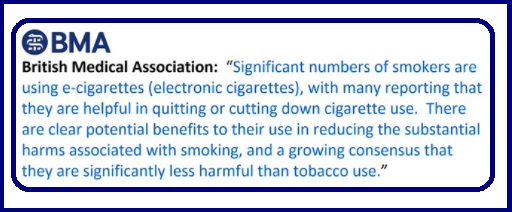
Cancer Research UK
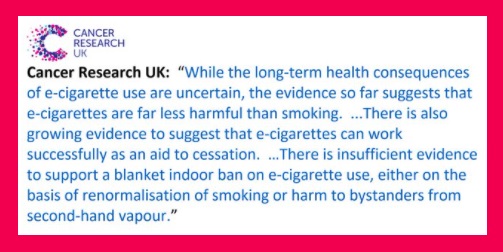
British Lung Foundation

Asthma + Lung UK
“E-cigarettes are a relatively new stop smoking tool, but if used correctly represent a big opportunity to reduce the harms caused by smoking, and to help smokers quit their addiction. They are thought to be at least 95% less harmful to health than tobacco, and evidence suggests that for many they are an effective means to give up smoking. …Nearly a third of smokers have never tried vaping. There is a big opportunity to encourage as many smokers as possible to transition to vaping, and in doing so reduce their health risks.”
Primary Care Respiratory Society
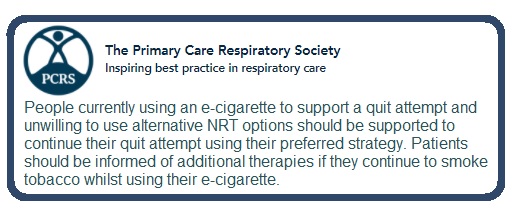
Roy Castle Lung Cancer Foundation
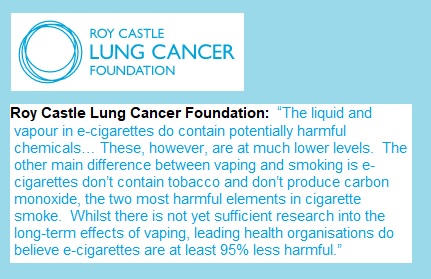
British Thoracic Society

British Heart Foundation
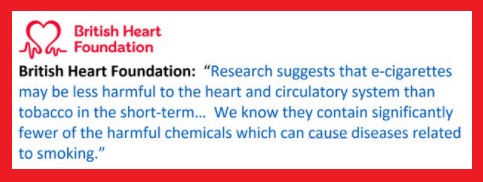
The British Psychological Society
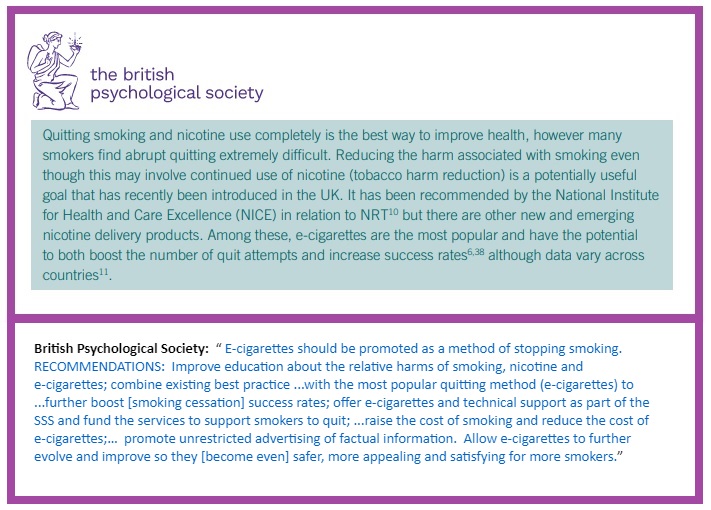
(Use 2nd quote from the graphic)
National Institute for Health and Care Excellence (NICE)

Royal College of General Practitioners

Royal Society for Public Health

Stroke Association

College of Occupational Therapists
Action on Smoking and Health UK (ASH)

National Centre for Smoking Cessation and Training (NCSCT)

Royal college of Psychiatrists
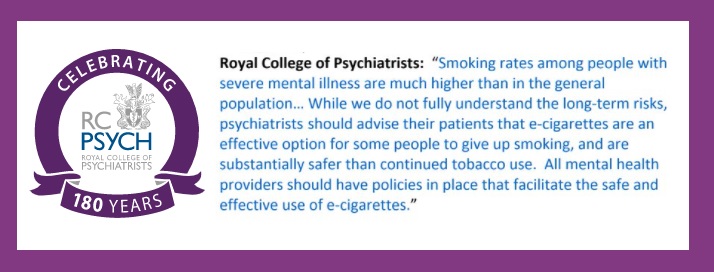
Faculty of Public Health
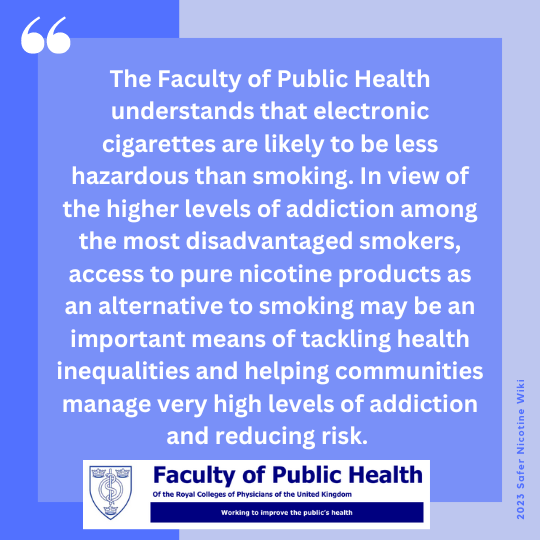
Royal Pharmaceutical Society
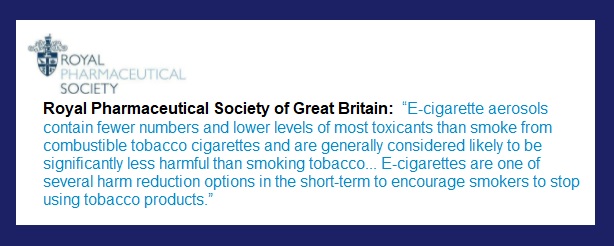
Royal College of Midwives
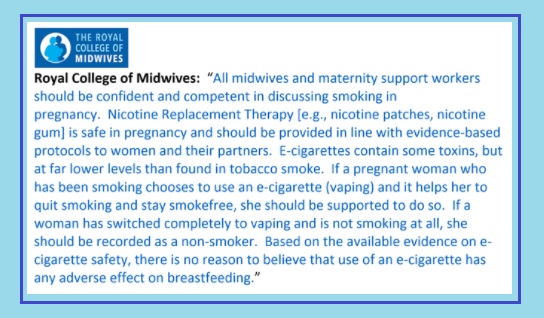
Chartered Institute of Environmental Health
LGBT Foundation

UK Teratology Information Service
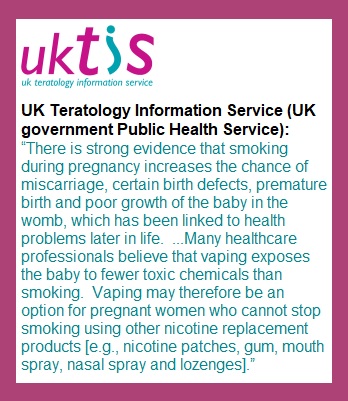
Centre for Mental Health
London Fire Brigade

UK National Fire Chiefs Council

Association of Directors of Public Health North East
Rethink Mental Illness
UK Centre for Tobacco and Alcohol Studies
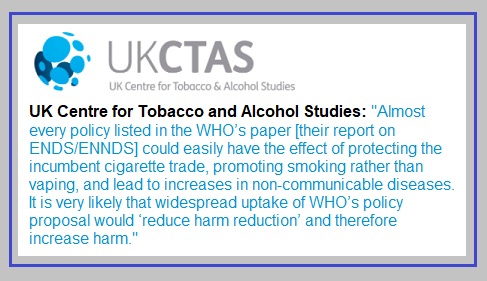
Royal College of Nursing
House of Commons Science and Technology Committee (UK)
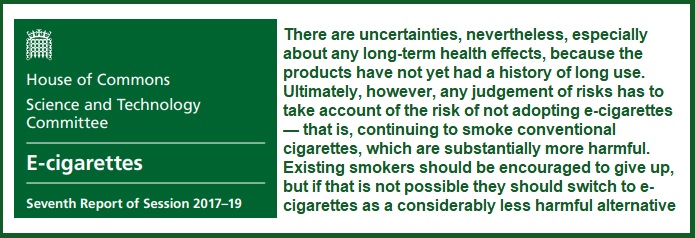
Heart UK
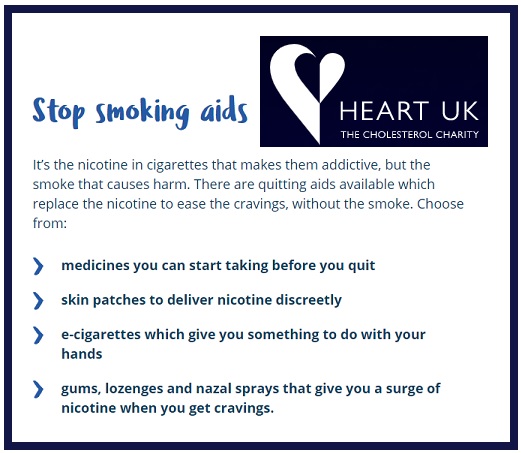
Association of Directors of Public Health
College of Mental Health Pharmacy
Fresh North East
Healthier Futures
Mental Health Foundation
Mental Health Nurses Association
London Tobacco Alliance
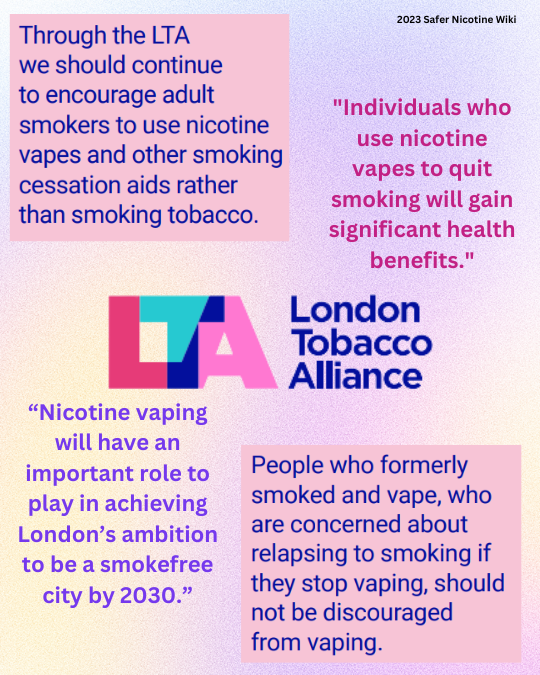
Mental Health Providers Forum
Public Health Action
North East North Cumbria ICB Smokefree
Smokefree Yorkshire & Humber
Hertfordshire County Council
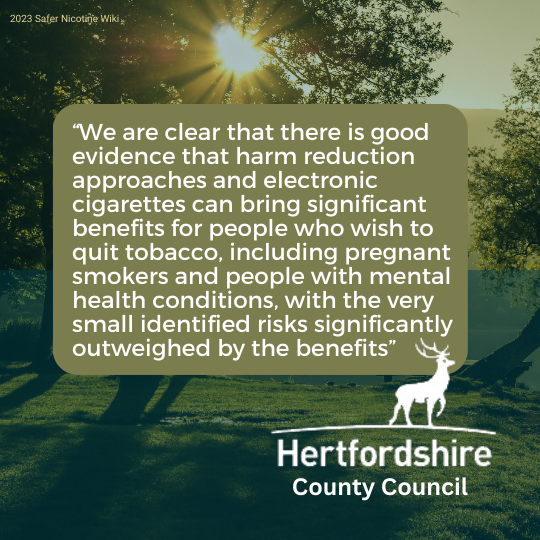
Camden and Islington Public Health
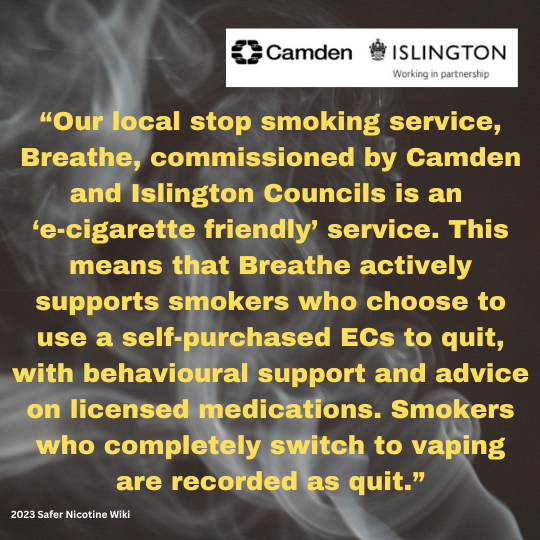
Unite in Health
Public Health Nottinghamshire County
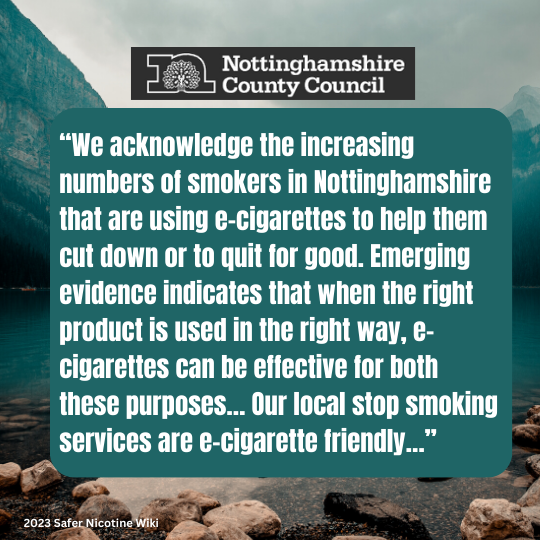
Tobacco Control Collaborating Centre
York Mental Health & Addictions Research Group
Oral Health Foundation
- Source (Formerly known as the British Dental Health Foundation)
Drug Science UK
Men's Health Forum UK
Scottish Government
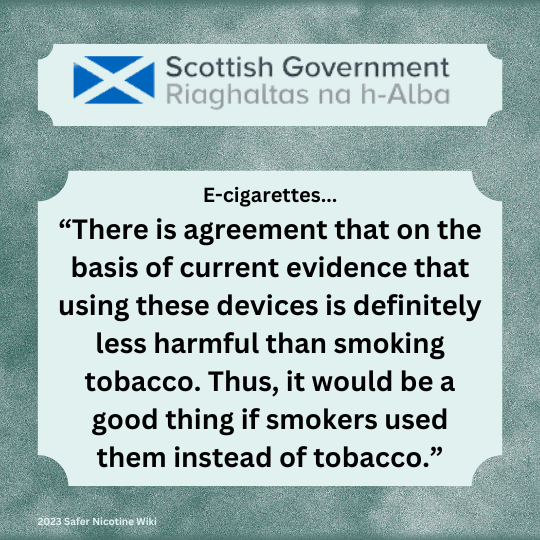
Scottish Directors of Public Health
Scottish Health Promotion Managers
National Health Service Scotland
Action on Smoking and Health Scotland
NHS Lothian
NHS Ayrshire and Arran - Scotland
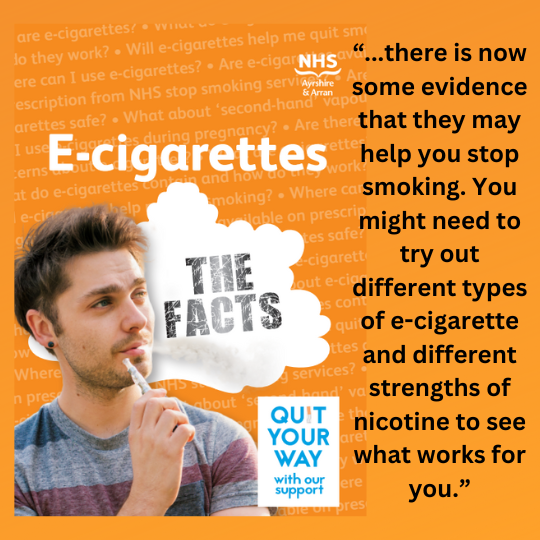
NHS Glasgow and Clyde - Scotland
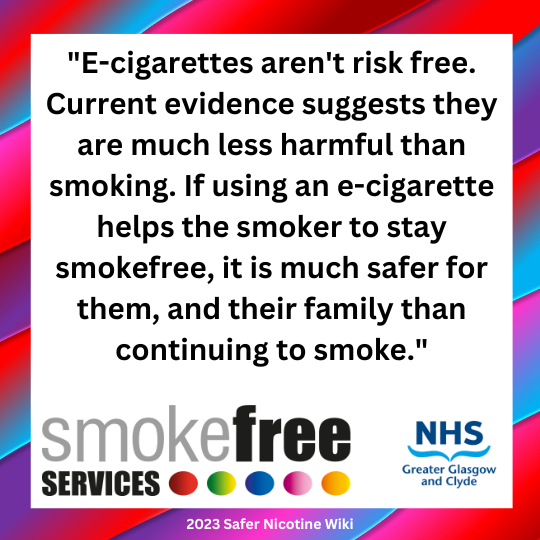
Scottish Collaboration for Public Health Research and Policy
Chest Heart & Stroke Scotland
NHS Tayside
Royal College of Physicians and Surgeons of Glasgow
Royal College of Physicians of Edinburgh
Royal Environmental Health Institute of Scotland
Scottish Consultants in Dental Health
Health Information and Quality Authority (Ireland)

Irish Cancer Society
The Chartered Institute of Personnel and Development
Irish Heart Foundation
Health and Safety Executive
ASH Ireland
Health Service Executive
Men’s Development Network
Dental Health Foundation - Ireland
Mental Health Ireland
Irish Medical Organisation
Irish Pharmacy Union
Men's Health Forum - Ireland
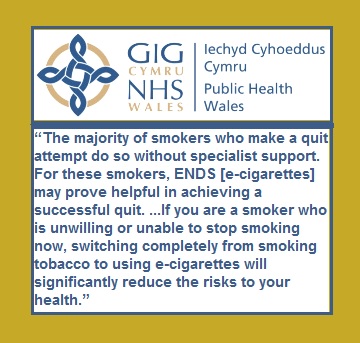
Australia (See Also: "Australia and New Zealand")
Therapeutic Goods Administration (Australia)]
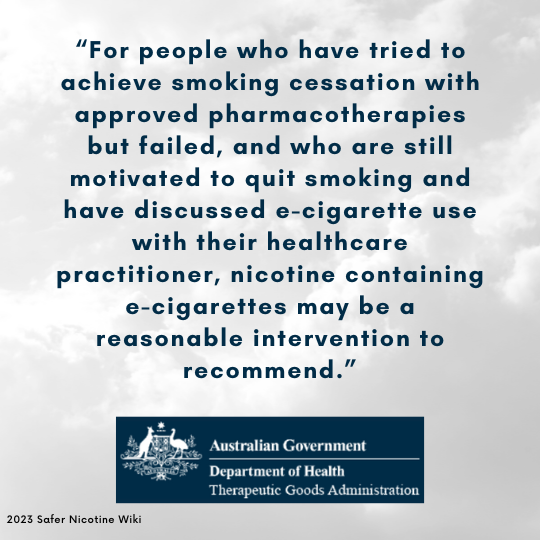
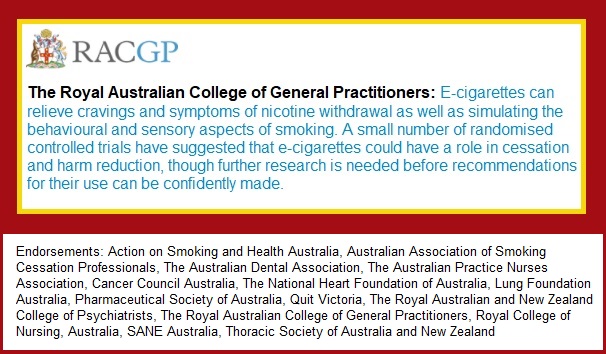
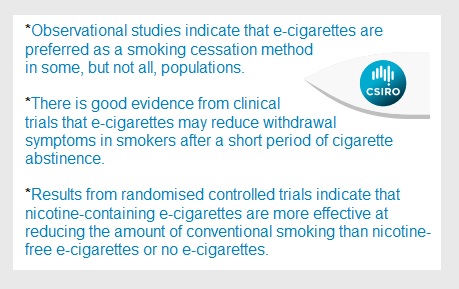
Australia and New Zealand

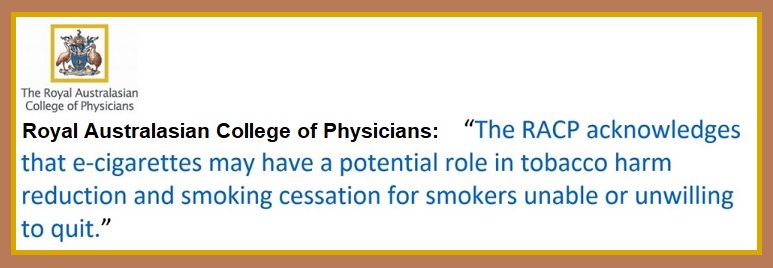
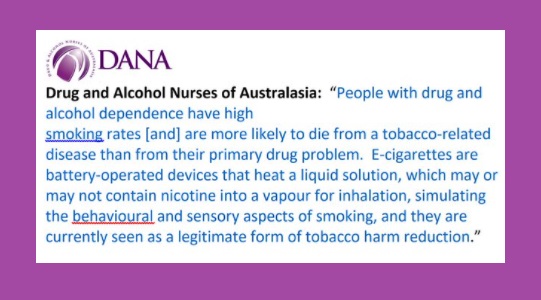
Belgium
Belgian Superior Health Council
“Yes, the e-cigarette has its risks, but is clearly less harmful than a traditional tobacco cigarette. According to the Council, the e-cigarette can therefore be a tool to give up tobacco completely.” [Google Translate]
Canada
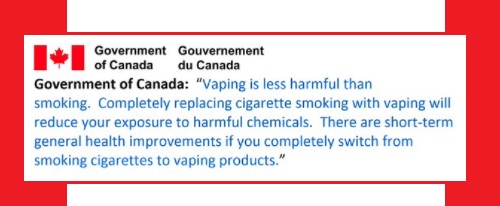
Health Canada
“If you are an adult that currently smokes, switching completely to vaping is a less harmful option than continuing to smoke. …Vaping is not known to cause Popcorn lung.” (January 2023) “While vaping products are not harmless, vaping exposes people who smoke to lower levels of harmful chemicals than continuing to smoke.” Statement from Minister of Health (January 16 2023).
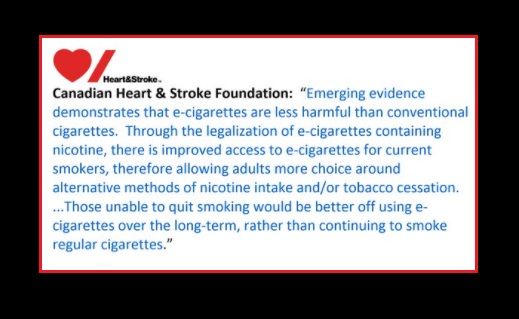
Centre for Addiction and Mental Health +3 organizations - Canadian Lower-Risk Nicotine Use Guidelines (LRNUG)
“Funded by Health Canada’s Substance Use and Addictions Program, the LRNUG has developed several resources to help guide people who use, or are thinking about using nicotine, on how to lower the risk associated with these products. ...E-cigarettes with nicotine may be an effective cessation aid for people who use combustible tobacco. People who switch from combustible tobacco to e-cigarettes will reduce their exposure to numerous toxicants and carcinogens.” Quick Tips: “Using tobacco in forms that don’t burn, like smokeless tobacco or heat-not-burn products, will reduce your exposure to harmful combusted chemicals including carbon monoxide. [You can] further reduce your risk by switching to products that don’t have tobacco like NRT [e.g., nicotine patches or nicotine gum] or e-cigarettes.” Statement by: CAMH - Centre for Addiction and Mental Health, Pharmacists for a Smoke-free Canada, The Ontario Tobacco Research Unit, Centre for Effective Practice
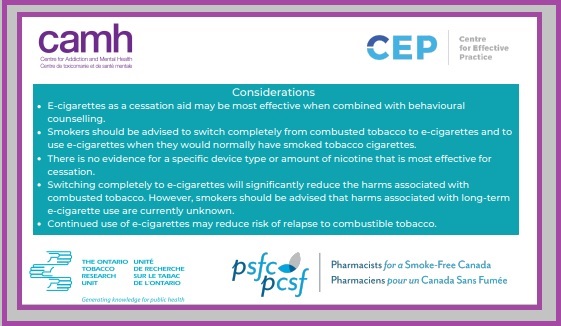


England (See Multinational pt. 2/United Kingdom)
France
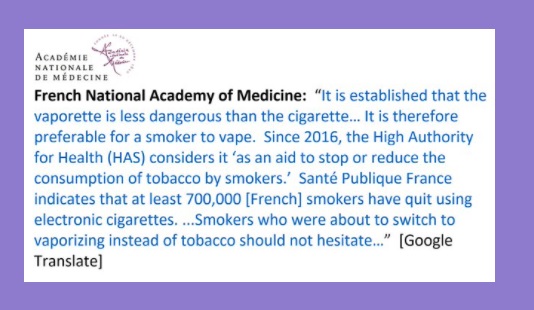
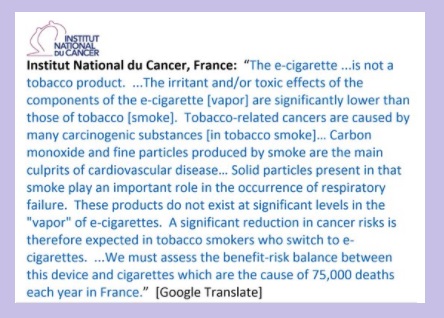
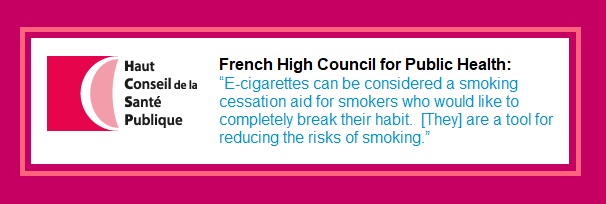

Collège de la médecine générale (College of General Medicine)
“Concerning the electronic cigarette, we consider it as a risk reduction tool and believe that we should not discourage the smoking patient who is learning to vape with a view to weaning [reducing smoking] by indicating to him that it is necessary to avoid the use concomitant cigarette/e-cigarette.”
Germany

German Society of Addiction (Deutsche Suchtgesellschaft – Dachverband der Suchtfachgesellschaften)
“In general, one can assume that the vapor from an e-cigarette is much less harmful than conventional cigarette smoke and that the e-cigarette can be used for nicotine withdrawal if guideline-based psychotherapeutic and/or drug treatments for nicotine withdrawal are ineffective or unwanted.”
Ireland (See Multinational pt. 2/United Kingdom)
Isle of Man
Public Health Isle of Man
“E-cigarettes can be a particularly helpful way to stop smoking tobacco especially when combined with a specialist face to face support. Although experts say they are not entirely risk free, they are at least 95% less harmful than tobacco.”
Luxembourg
Fondation Cancer
“The electronic cigarette … does not contain tobacco. The vapor produced does not contain carbon monoxide or carcinogenic substances in significant quantities. Despite a lack of long-term scientific studies, it probably presents a reduced risk compared to tobacco (if not combined with cigarettes). …In general, we recommend that you vape with the most concentrated liquid possible, in order to reduce your consumption of liquid and therefore your exposure to inhaled substances.” [emphasis in original] [Google Translate]
Malaysia
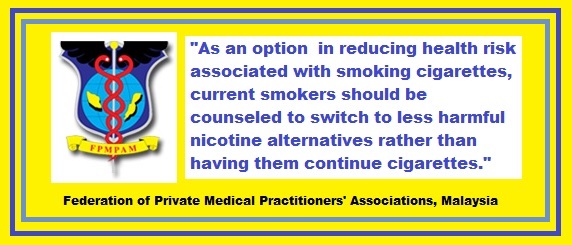
New Zealand (See Also: "Australia and New Zealand")
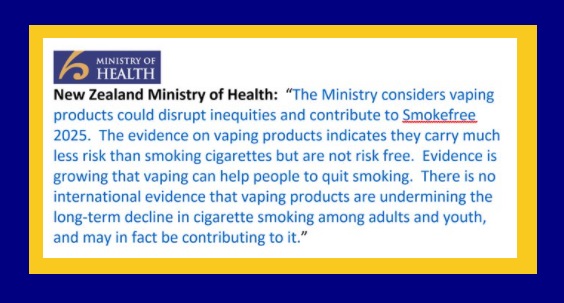
Official New Zealand Ministry of Health Position Statement
“Vaping is not harmless but it is much less harmful than smoking. Vaping has the potential to help people quit smoking and contribute to New Zealand’s Smokefree 2025 goal.” Organizations that support this statement include: Health Promotion Agency/Te Hiringa Hauora (HPA), Hāpai te Hauora/Māori Public Health, New Zealand Medical Association (NZMA), Action for Smokefree 2025 (ASH), National Training Service (NTS), All District Health Boards, Pharmacy Guild of New Zealand, New Zealand Heart Foundation, New Zealand College of Midwives, Parents Care Centre
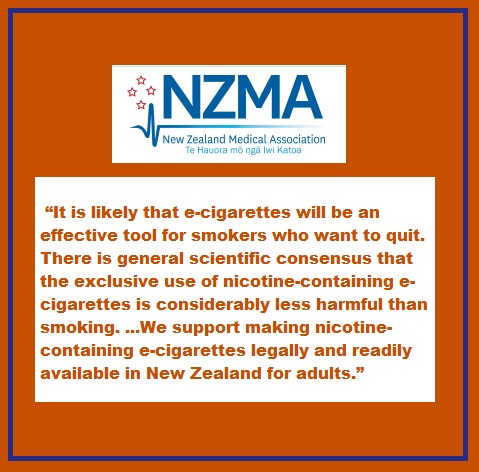
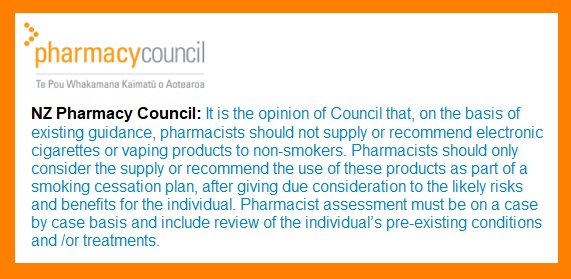
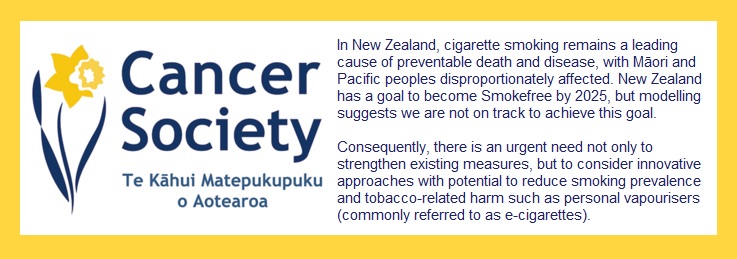
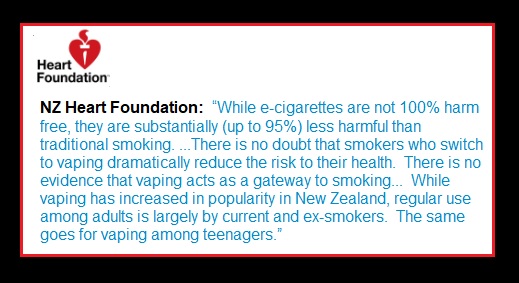
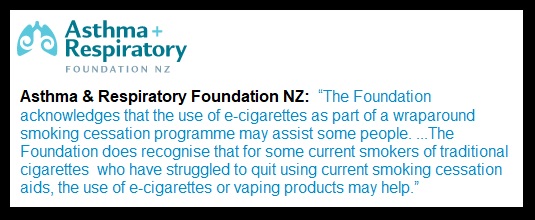
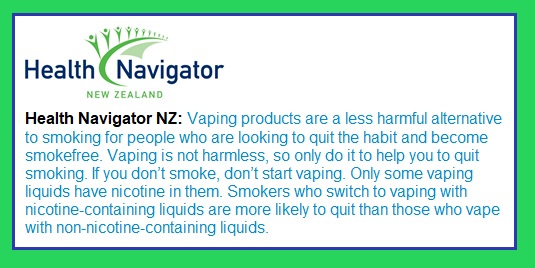
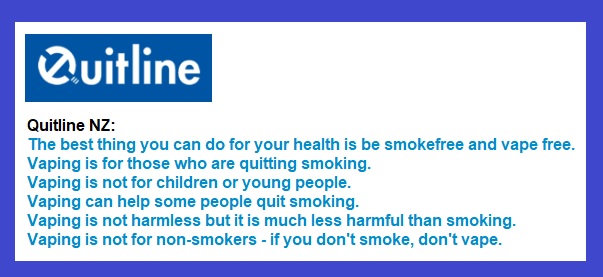
Philippines
2018
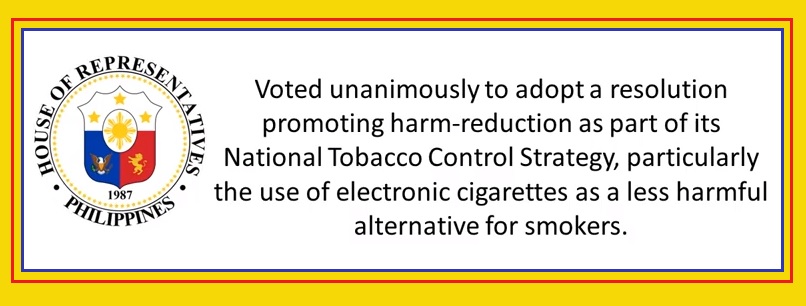
Scotland (See Multinational pt. 2/United Kingdom)
United Kingdon (See Multinational pt. 2/United Kingdom)
United States
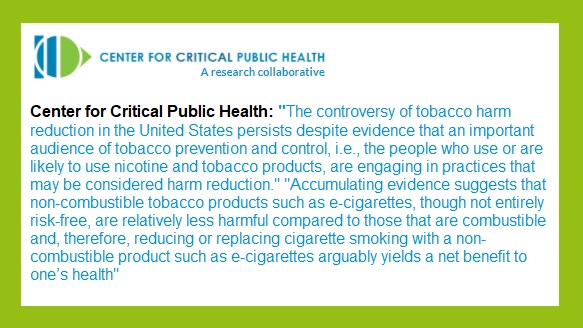
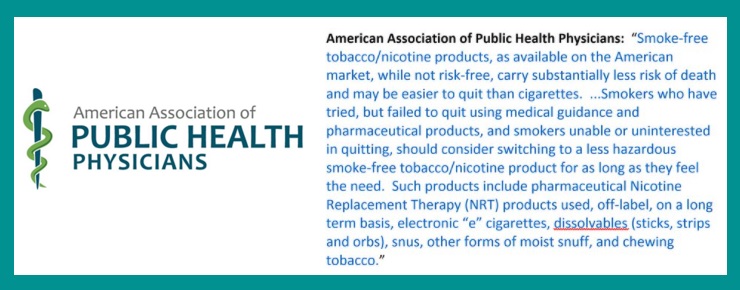

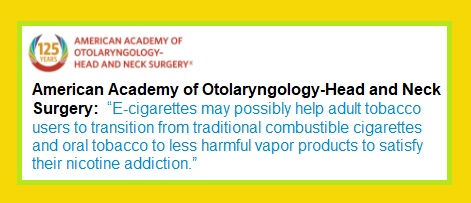
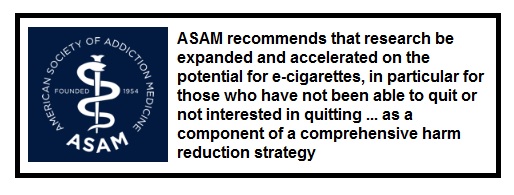

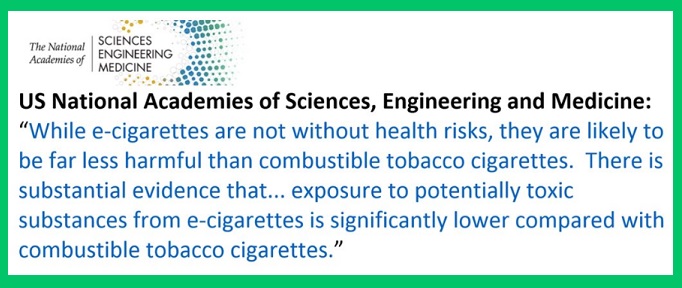
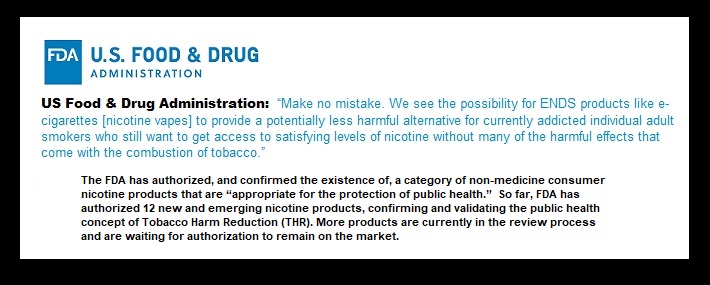
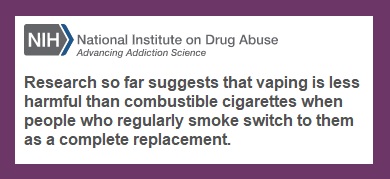


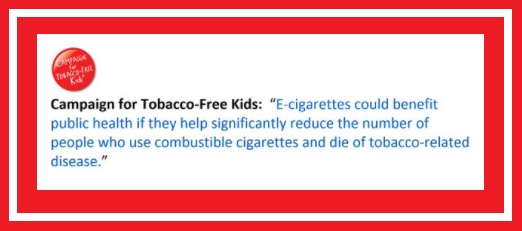
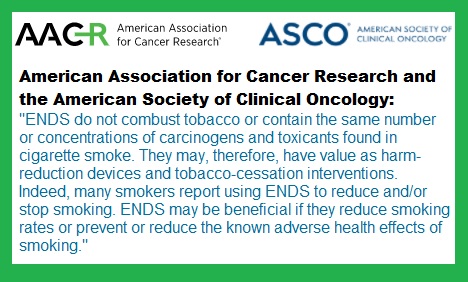
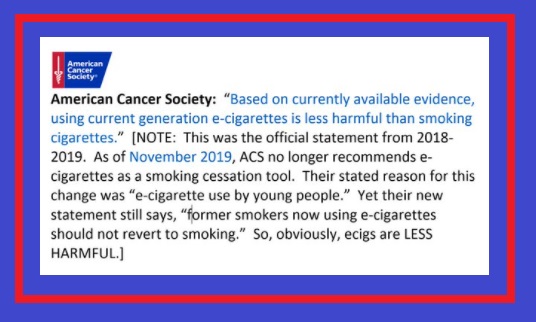
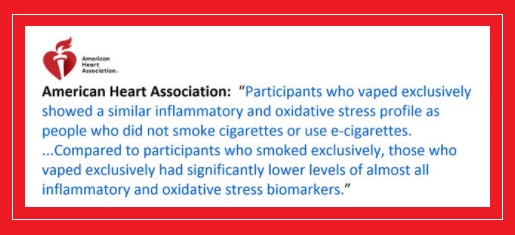
2022
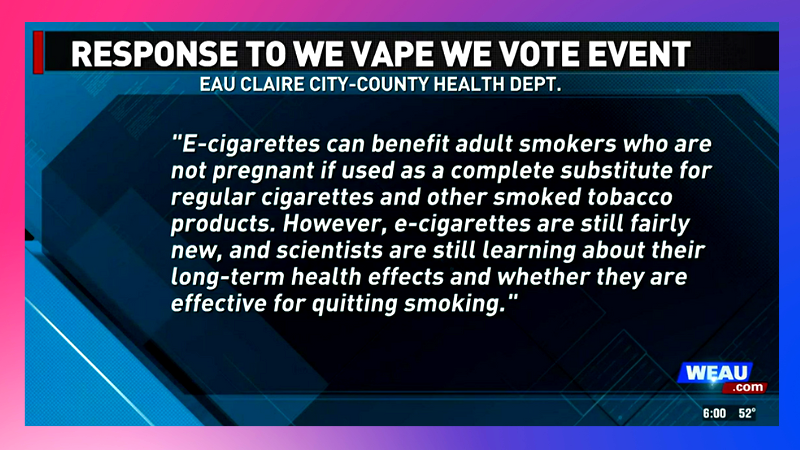
Uruguay
2021

Wales (See Multinational pt. 2/United Kingdom)
Suggestions to add to this page
- "Smoking rates are dropping, thanks to price increases associated with tobacco taxes, smoking bans, and other evidence-based practices outlined in the WHO Framework Convention on Tobacco Control.Even if these practices are scaled up, however, millions of smokers will still suffer death, disease, and disability. Alternative tobacco products, including e-cigarettes, aren’t harmless, but they may be less harmful. We need to understand whether they could change the course of the smoking epidemic without addicting youth.”
2021: The Sheffield Tobacco Control Board Policy Position on electronic-cigarettes (also known as vaping)
- While abstinence from tobacco use is the ideal, the next-best result, for individuals who can’t or don’t want to quit nicotine, is movement down the continuum of risk: away from combusted tobacco to a less harmful product. One possible alternative: E-cigarettes.